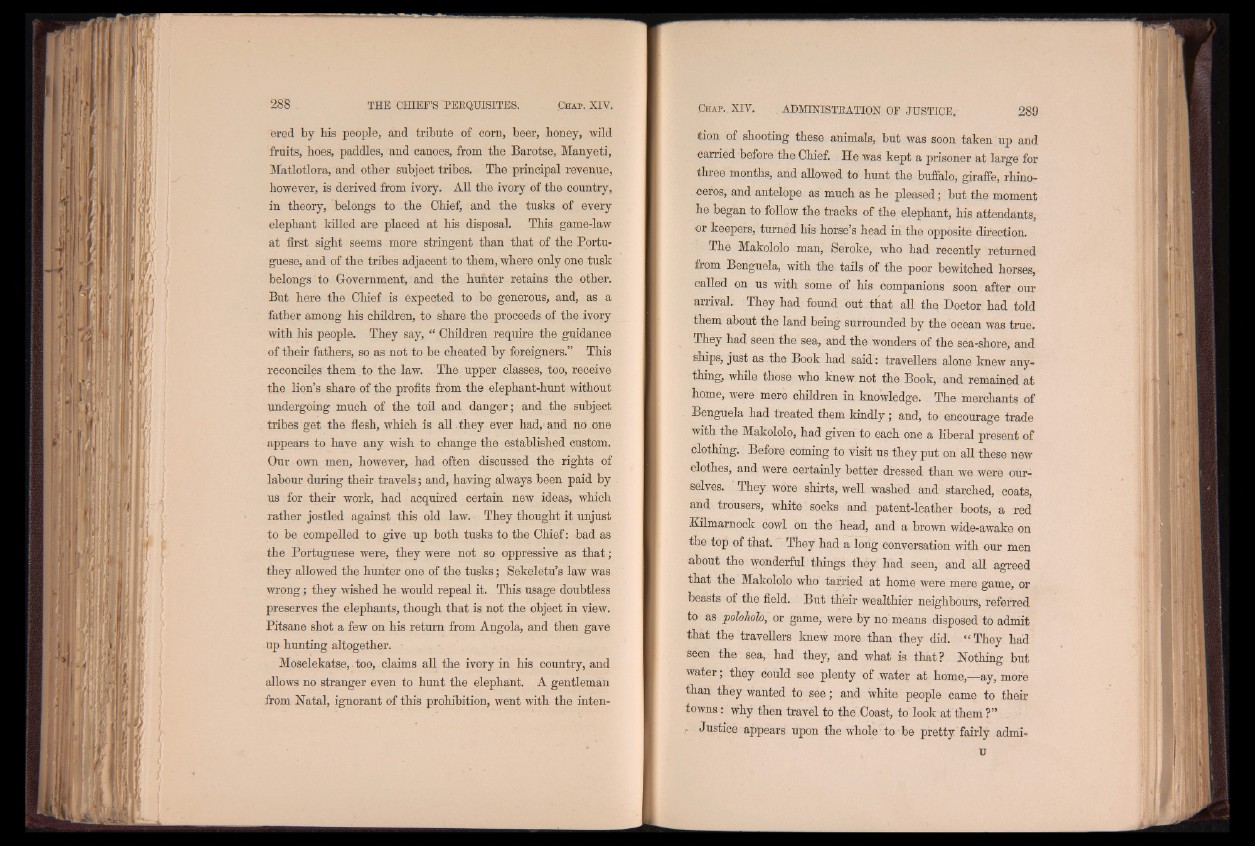
ered by his people, and tribute of corn, beer, honey, wild
fruits, hoes, paddles, and canoes, from the Barotse, Manyeti,
Matlotlora, and other subject tribes. The principal revenue,
however, is derived from ivory. All the ivory of the country,
in theory, belongs to the Chief, and the tusks of every
elephant killed are placed at his disposal. This game-law
at first sight seems more stringent than that of the Portuguese,
and of the tribes adjacent to them, where only one tusk
belongs to Government, and the hunter retains the other.
But here the Chief is expected to be generous, and, as a
father among his children, to share the proceeds of the ivory
with his people. They say, “ Children require the guidance
of their fathers, so as not to be cheated by foreigners.” This
reconciles them to the law. The upper classes, too, receive
the lion’s share of the profits from the elephant-hunt without
undergoing much of the toil and danger; and the subject
tribes get the flesh, which is all they ever had, and no one
appears to have any wish to change the established custom.
Our own men, however, had often discussed the rights of
labour during their travels; and, having always been paid by
us for their work, had acquired certain new ideas, which
rather jostled against this old law. They thought it unjust
to be compelled to give up both tusks to the Chief: bad as
the Portuguese were, they were not so oppressive as th a t;
they allowed the hunter one of the tusks; Sekeletu’s law was
wrong; they wished he would repeal it. This usage doubtless
preserves the elephants, though that is not the object in view.
Pitsane shot a few on his return from Angola, and then gave
up hunting altogether.
Moselekatse,. too, claims all the ivory in his country, and
allows no stranger even to hunt the elephant. A gentleman
from Natal, ignorant of this prohibition, went with the intention
of shooting these animals, but was soon taken up and
carried before the Chief. He was kept a prisoner at large for
three months, and allowed to hunt the buffalo, giraffe, rhinoceros,
and antelope as much as he pleased; but the moment
he began to follow the tracks of the elephant, his attendants,
or keepers, turned his horse’s head in the opposite direction.
The Makololo man, Seroke, who had recently returned
from Benguela, with the tails of the poor bewitched horses,
called on us with some of his companions soon after our
arrival. They had found out that all the Doctor had told
them about the land being surrounded by the ocean was true.
They had seen the sea, and the wonders of the sea-shore, and
ships, just as the Book had said: travellers alone knew any-
thing, while those who knew not the Book, and remained at
home, were mere children in knowledge. The merchants of
Benguela had treated them kindly; and, to encourage trade
with the Makololo, had given to each one a liberal present of
clothing. Before coming to visit us they put on all these new
clothes, and were certainly better dressed than we were ourselves.
They wore shirts, well washed and starched, coats,
and trousers, white socks and patent-leather boots, a red
Kilmarnock cowl on the head, and a brown wide-awake on
the top of that. They had a long conversation with our men
about the wonderful things they had seen, and all agreed
that the Makololo who tarried at home were mere game, or
beasts of the field. But their wealthier neighbours, referred
to as poloMo, or game, were by no means disposed to admit
that the travellers knew more than they did. “ They had
seen the sea, had they, and what is that? Nothing but
water; they could see plenty of water at home,—ay, more
than they wanted to see; and white people came to their
towns : why then travel to the Coast, to look at them?”
r Justice appears upon the whole to be pretty fairly admiu